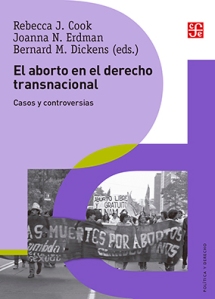SUBSCRIBE TO REPROHEALTHLAW: To receive these updates monthly by email, enter your address in upper right corner of this webpage, then check your email to confirm the subscription.
DEVELOPMENTS
Argentina: Juzgado Nacional en lo Criminal de Instrucción 16, Secretaría 111 de la Capital Federal, causa 28.580/2015, “M.N.N.” (28 de Junio de 2016). National Criminal Court held a woman and the doctors who prescribed her abortion medications, not guilty of any crime because the woman’s health was at risk. The woman was pregnant because her partner raped her. English summary. Spanish summary. Download decision in Spanish.
Colombia: Constitutional Court blocked sterilization of a disabled girl who was too young to consent. English summary. Spanish summary with link to decision.
India: Indu Devi v the State of Bihar [2017] No(s.) 14327, decided May 9, 2017 (Supreme Court of India). Destitute HIV+ woman, pregnant from rape, refused abortion past legal limit of 20 weeks, but State held responsible for delay that prevented legal abortion. Summary by H. Kofman forthcoming on this blog Judgment online. Abstract by law student H. Kofman
Uruguay: Woman refused legal abortion after former partner intervenes. Summary in English. Spanish summary with link to decision. Safe Abortion Campaign report.
CALLS
Gender Justice Uncovered Awards: Nominations for best and worst court decisions. Many striking cases and decisions summarized, e.g., Argentina, Colombia and Uruguay decisions mentioned above. Vote before May 31, 2017
Call for Submissions: “Gender Violence and International Human Rights Law” for the 2018 Human Rights Essay Award, organized by Academy on Human Rights and Humanitarian Law, Washington College of Law, American University, Washington DC. Submission Information and form.
Open Call for Submissions, McGill Journal of Law and Health, peer-reviewed. Details and Editorial Guidelines.
EDUCATIONAL OPPORTUNITIES
Graduate study in Health Law now available at the Centre for Health Law, Policy and Ethics, University of Ottawa, currently accepting LLM and PhD applications on a rolling basis for the 2017-2018 academic year. Brochure online.
RESOURCES
“Abortion by telemedicine: an equitable option for Irish women,” by Wendy V. Norman and Bernard M. Dickens, BMJ May 16, 2017; 357 Article online.
[abortion, Canada] “A Constitutional Future for Abortion Rights in Canada,” by Joanna Erdman, Alberta Law Review 54.3(2017):727-752 Article online.
[abortion, Europe] “Legal and Political Discourses on Women’s Right to Abortion,” by Christina Zampas, chapter 1 in: A Fragmented Landscape: Abortion Governance and Protest Logics in Europe, ed. Silvia De Zordo, Joanna Mishtal, and Lorena Anton (New York: Berghahn, 2016) Details from Publisher
[abortion law] “Regulating Abortion: Dissensus and the Politics of Rights” by Siobhan Mullally, introduction to special issue of Social & Legal Studies: An International Journal, 2016, Vol.25(6) . Introduction online.
[abortion law] “Book Review: Francisca Pou Giménez on Rebecca J. Cook, Joanna Erdman and Bernard M. Dickens’s Abortion Law in Transnational Perspective: Cases and Controversies”, on I-CONnect, Blog of the International Journal of Constitutional Law and Constitution Making, May 17, 2017 Book review online. (Penn Press discount code: PH70). Spanish edition, FCE/CIDE, 2016
[abortion law pedagogy] “The Social Life of Abortion Law: On Personal and Political Pedagogy,” by Nicky Priaulx, Medical Law Review 25.1(2017):73-98. Download abstract and PDF.
[abortion travel] “The Law of Stigma, Travel, and the Abortion-Free Island,” Columbia Journal of Gender & Law 33.1(2016): 29-37. PDF online.
[conscience] “Physicians, Not Conscripts — Conscientious Objection in Health Care,” by Ronit Y. Stahl and Ezekiel J. Emanuel, New England J Medicine 376 (April 6, 2017): 1380-85. Full text for institutional subscribers
[Ireland] The Citizens’ Assembly – Draft Bill [recommendations for Irish abortion law reform] by Lawyers for Choice, Human Rights in Ireland, April 25, 2017 Draft Bill online.
[Nigeria] “Accountability for Maternal Healthcare Services in Nigeria,” by Onyema Afulukwe, International Journal of Gynecology and Obstetrics 137.2(May 2017) 220-226. Abstract. PDF temporarily online for 12 months Submitted text (typescript) online.
Northern/Irish Feminist Judgments: Judges’ Troubles and the Gendered Politics of Identity, edited by Máiréad Enright, Julie McCandless and Aoife O’Donoghue (Oxford: Hart, 2017) re-imagines, re-writes and comments on 26 court decisions from feminist perspectives. Our comments. Table of Contents and details
[South Africa] Pregnancy Law in South Africa: Between Reproductive Autonomy and Foetal Interests, by Camilla Pickles (South Africa: Juta, 2017), (based on thesis from University of Pretoria, Thesis abstract Book details from publisher
US-focused news, resources, and legal developments are available on Repro Rights Prof Blog. View or subscribe.
REPORTS
“The Law, Trials and Imprisonment for Abortion in [individual countries].” International Campaign for Safe Abortion. Mexico. Argentina, Kenya .
JOBS
Associate Professor/Professor and Assistant Director, Center for Human Rights, Faculty of Law, University of Pretoria. Position details.
Links to other employers in the field of Reproductive and Sexual Health Law are online here
______________
Compiled by the Coordinator of the International Reproductive and Sexual Health Law Program, reprohealth*law at utoronto.ca For Program publications and resources, see our website, online here. TO JOIN THIS BLOG: enter your email address in upper right corner of this webpage, then check your email to confirm the subscription.



 Posted by reprohealthlaw
Posted by reprohealthlaw 



